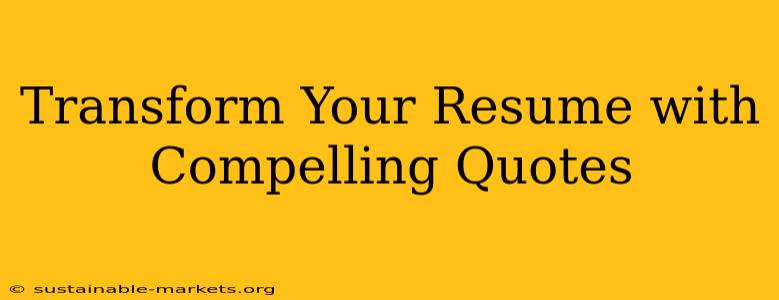In today's competitive job market, a resume is more than just a list of your accomplishments; it's your personal brand story. To truly captivate recruiters and land that coveted interview, you need to go beyond the standard format. One powerful way to achieve this is by strategically incorporating compelling quotes. But how do you do it effectively without appearing cheesy or unprofessional? This guide will show you how to leverage the power of quotes to transform your resume and make it truly shine.
Why Use Quotes on Your Resume?
Before we dive into the how-to, let's address the why. Using quotes strategically on your resume can:
- Showcase your personality: A carefully chosen quote can reveal aspects of your personality and work ethic that may not be apparent from a simple description of your skills and experience.
- Highlight key skills and values: Quotes can subtly emphasize specific skills or values relevant to the target job, reinforcing the message conveyed in your work history.
- Add memorability: A well-placed quote makes your resume more memorable, helping you stand out from a pile of generic applications.
- Demonstrate your passion: A quote reflecting your enthusiasm for the field demonstrates your genuine interest and commitment.
- Provide context: Quotes can add context to your experience, enriching the narrative of your career journey.
However, it's crucial to remember that using quotes is a delicate balancing act. Overdoing it can make your resume look cluttered and unprofessional. The key is selectivity and relevance.
Where to Incorporate Quotes on Your Resume?
The best placement for a quote is often in a dedicated "Summary" or "Profile" section at the beginning of your resume. This section sets the tone and provides a brief overview of your key skills and qualifications. Another suitable place could be in a section dedicated to a significant accomplishment or project, where the quote can provide further context and impact.
Avoid placing quotes within the body of your work experience descriptions, as it can disrupt the flow and readability. Keep it concise and to the point.
What Types of Quotes to Use?
The best quotes are short, impactful, and directly relevant to your career aspirations. Here are some ideas:
- Inspirational Quotes: These can showcase your ambition and drive. However, avoid clichés; choose something unique and meaningful.
- Quotes Related to Your Industry: Using a quote from a prominent figure in your industry can demonstrate your knowledge and passion for the field.
- Quotes Reflecting Your Values: Choose a quote that aligns with your personal and professional values, such as teamwork, innovation, or dedication.
- Quotes from Your Previous Work: If you have a quote that reflects your philosophy or approach to work from a previous position or client, this can demonstrate insight and experience.
Always properly attribute the quote! Including the author's name adds credibility and professionalism.
What Kind of Quotes Should I Avoid?
- Overused clichés: Avoid common phrases that lack originality and impact.
- Long, rambling quotes: Keep it short and sweet – a few words can be more effective than a long passage.
- Irrelevant quotes: The quote must connect to your career goals and the specific job you are applying for. A random quote won't impress anyone.
- Controversial quotes: Steer clear of anything that could be perceived as offensive or politically charged.
How to Write a Compelling Quote Section on Your Resume
Let’s say you’re applying for a marketing role and you want to showcase your creativity. You could use a quote like:
"Creativity is allowing yourself to make mistakes. Art is knowing which ones to keep." - Scott Adams
This quote is short, insightful, and directly relevant to the creative nature of marketing. It also adds a touch of personality, making your resume more engaging.
Remember, the goal isn't to fill your resume with quotes; it's to strategically use one or two powerful quotes that enhance your overall presentation and make your application stand out.
Frequently Asked Questions
Are quotes suitable for all resume types?
While quotes can be effective, they are most suited for roles requiring creativity, innovation, or strong communication skills. For highly technical roles, a more traditional approach might be better.
Can I use a quote from myself?
This is generally discouraged. While you can reflect your personal philosophy, it's better to use a quote from a well-known figure or a relevant source to add authority.
What font and style should I use for the quote?
Use a consistent font throughout your resume. You can subtly emphasize the quote by using italics or a slightly different font weight, but don't overdo it.
By thoughtfully incorporating compelling quotes into your resume, you can elevate your application from a simple document to a compelling narrative, increasing your chances of securing that interview. Remember, authenticity and relevance are key to success.

